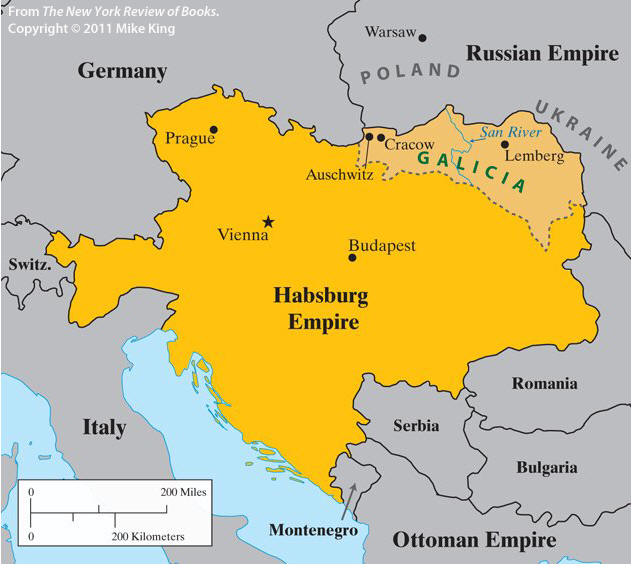The Empire without Qualities?
Dubbed the 'Empire without qualities' by Christopher Clark in 'The Sleepwalkers', the Habsburg Empire is widely regarded as a crumbling regime, and is often coupled with Ottoman Turkey, 'the sick man of Europe'. It's fall was simply accelerated by defeat and partition in the First World War. The sheer diversity of the races contained within its borders mean that many believe it was condemned to be torn apart by the force of nationalism.
 |
| Habsburg Empire in 1914 |
In the Aftermath of the disastrous Austro-Prussian War of 1966, the Austrian Habsburg dynasty, who commanded authority over the entire empire, ceded a great deal of power to the discontented Magyars, in the Ausgleich or compromise of 1867. This created the two separate but equal kingdoms of Austria and Hungary, united under a single Sovereign, Emperor Franz Joseph. This complicated constitutional arrangement allowed for Hungary's new autonomy while maintaining the Ancient links.
 |
| Emperor Franz Josef |
However, the Magyars were still largely disillusioned by their new powers, they disliked the common army whose German insignia and words of command illustrated Austrian dominance. They also feared Russia, their one time conquerer and leading slav power. They felt that the common foreign policy was not sufficiently anti-Russian. As the Austrians were also dissatisfied with the concessions, and hoped to eventually reassert autonomy over the whole Empire, conflict between the two ruling ethnicities was extremely likely. The rivalry and hostility between the racially German Austrians, and the Magyar Hungarians threatened to sever the dual monarchy into two independent states. This divide was exacerbated by the dualist economics of the empire. Austria was highly industrialised, while Hungary was primarily agrarian. As far as the Austrians were concerned, the agricultural areas of Hungary were a burden on resources. The regionalisation of the economy also heightened national grievances. For example, the Czechs, who were the majority in Industrial Bohemia could justifiably claim they were better off independent ad they could take full advantage of their wealth.
Additionally, the sheer diversity of races in the empire dominated Habsburg politics throughout 1890-1914. The state contained; Germans, Magyars, Czechs, Poles, Ruthenes, Italians, Romanians, Slovaks, Slovenes, Serbs, Croats as well as 469,255 members of other ethnicities at the time of the 1910 Census.
This was a hotbed for tensions, as the 19th Century was the age of the nation state. During this era, many of the separate nationalities of Europe had succeeded in winning their own states and autonomy. The Greeks, Germans and Italians had all achieved this by 1890. Groups contained within the Empire, such as the Czechs and Poles believed that their numbers and distinct cultures meant that they should also have their own states. At the very least, the nationalists demanded a measure of independence from the central government. for example, they wanted to have national universities and to be able to use their own language in government. Other races, particularly the South Slavs (Slovaks, Slovenes, Serbs and Croats) didn't just want civil rights, but wanted to join with ascendent Serbia to create 'Yugoslavia' Slavic federation.
to complicate the issue further, many areas were of mixed population. In Bohemia, the population was divided into 37% German and 63% Czech, meaning that if the official language was Czech, a large minority would be dissatisfied. In other areas, such as Bukovina, whose population was composed of 39% Ruthenian, 34% Romanian, 21% German, 5% Polish and 1% Magyar, laws that would seem 'fair' to all nationalities were impossible.
The regime's response was often heavy handed, particularly in the Kingdom of Hungary. the Magyars suppressed minority races and ensured their own dominance; despite being a minority themselves, they provided over 90% of state officials, doctors and judges. They also occupied 405 of 413 seats in the Diet (Hungarian Parliament). They dissolved the Romanian National party in 1894 as 'unconstitutional'. They implemented a policy of 'Magyarisation' to bring the minorities into line. magyar was made compulsory n all schools, even when no Magyars were present. The Apponyi Law of 1907 allowed teachers to dismiss pupils if they did not know Magyar. Local traditions were suppressed, often by force.
As well as internal problems, the empire was exposed on the international stage. The chief aim of Habsburg foreign policy was to ensure influence in the unstable Balkans and minimise Russian influence. This did not necessarily mean filling the power vacuum created by the ailing Ottoman empire, but making sure that new states established were benevolent towards her. However, Tsarist Russia's aims were identical, putting these two great powers on a collision course. This was complicated by the rise of Serbia, which acted independently of any great power, despite assurances of Russian support. This represented the greatest fears of Austria-Hungary - Russian influence and inflaming Slavic nationalism inside the empire. Serbia's great victories in the Balkan wars increased her prestige, and by 1914 almost all Austro-Hungarian politicians were convinced of the need for a preventive war with Serbia. As demonstrated by the slaughter of the First World war, localising such a conflict was no easy feat.
The Empire was dismembered by President Wilson's principles of self determination, but even victory in the First World War would not have substantially prolonged the life of the Monarchy. The severe ethnic divides within the monarchy made it a tinder box that would inevitably be sparked into a blaze by nationalism. The politics of democracy which were universally aligned towards a larger electorate undermined the autocratic structure. Suppression of the minority races depended on the divine right of Franz Joseph, a power being eroded by greater suffrage. Due to the random distribution of minorities within the Empire, even a federal system, effectively creating the 'United States of Central Europe', would fail on the basis that the states of Central Europe are not united.
Comments
Post a Comment